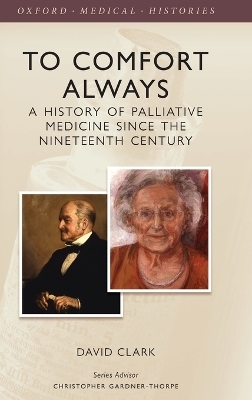
To Comfort Always
A history of palliative medicine since the nineteenth century
Seiten
2016
Oxford University Press (Verlag)
978-0-19-967428-2 (ISBN)
Oxford University Press (Verlag)
978-0-19-967428-2 (ISBN)
Covers the rise of clinical studies, academic programmes and international collaborations to promote palliative care. It examines the continuing need to provide evidence in support of development and assesses the dilemmas of unequal access to services and pain relieving drugs.
Palliative medicine was first recognised as a specialist field in 1987. One hundred years earlier, London based doctor William Munk published a treatise on 'easeful death' that mapped out the principles of practical, spiritual, and medical support at the end of life. In the intervening years a major process of development took place which led to innovative services, new approaches to the study and relief of pain and other symptoms, a growing interest in 'holistic' care, and a desire to gain more recognition for care at the end of life.
This book traces the history of palliative medicine, from its nineteenth-century origins, to its modern practice around the world. It takes in the changing meaning of 'euthanasia', assesses the role of religious and philanthropic organisations in the creation of homes for the dying, and explores how twentieth-century doctors created a special focus on end of life care. To Comfort Always traces the rise of clinical studies, academic programmes and international collaborations to promote palliative care. It examines the continuing need to support development with evidence, and assesses the dilemmas of unequal access to services and pain relieving drugs, as well as the periodic accusations of creeping medicalization within the field.
This is the first history of its kind, and the breadth of information it encompasses makes it an essential resource for those interested in the long-term achievements of palliative medicine as well as the challenges that remain.
Palliative medicine was first recognised as a specialist field in 1987. One hundred years earlier, London based doctor William Munk published a treatise on 'easeful death' that mapped out the principles of practical, spiritual, and medical support at the end of life. In the intervening years a major process of development took place which led to innovative services, new approaches to the study and relief of pain and other symptoms, a growing interest in 'holistic' care, and a desire to gain more recognition for care at the end of life.
This book traces the history of palliative medicine, from its nineteenth-century origins, to its modern practice around the world. It takes in the changing meaning of 'euthanasia', assesses the role of religious and philanthropic organisations in the creation of homes for the dying, and explores how twentieth-century doctors created a special focus on end of life care. To Comfort Always traces the rise of clinical studies, academic programmes and international collaborations to promote palliative care. It examines the continuing need to support development with evidence, and assesses the dilemmas of unequal access to services and pain relieving drugs, as well as the periodic accusations of creeping medicalization within the field.
This is the first history of its kind, and the breadth of information it encompasses makes it an essential resource for those interested in the long-term achievements of palliative medicine as well as the challenges that remain.
Professor David Clark is a sociologist at the University of Glasgow. He founded the International Observatory on End of Life Care at Lancaster University in 2003 and has wide ranging interests in the history and global development of palliative care. He has a particular knowledge of the life and work of Dame Cicely Saunders and has edited her letters and selected publications. He has written a History of the Project on Death in America and currently holds a Wellcome Trust Investigator Award for a study entitled Global Interventions at the End of Life.
INDEX
| Erscheinungsdatum | 10.12.2016 |
|---|---|
| Reihe/Serie | Oxford Medical Histories |
| Verlagsort | Oxford |
| Sprache | englisch |
| Maße | 166 x 235 mm |
| Gewicht | 530 g |
| Themenwelt | Medizin / Pharmazie ► Medizinische Fachgebiete ► Palliativmedizin |
| Studium ► Querschnittsbereiche ► Geschichte / Ethik der Medizin | |
| ISBN-10 | 0-19-967428-0 / 0199674280 |
| ISBN-13 | 978-0-19-967428-2 / 9780199674282 |
| Zustand | Neuware |
| Haben Sie eine Frage zum Produkt? |
Mehr entdecken
aus dem Bereich
aus dem Bereich
Die Geschichte eines Weltzentrums der Medizin von 1710 bis zur …
Buch | Softcover (2021)
Lehmanns Media (Verlag)
17,95 €
Krankheitslehren, Irrwege, Behandlungsformen
Buch | Softcover (2024)
C.H.Beck (Verlag)
39,95 €


